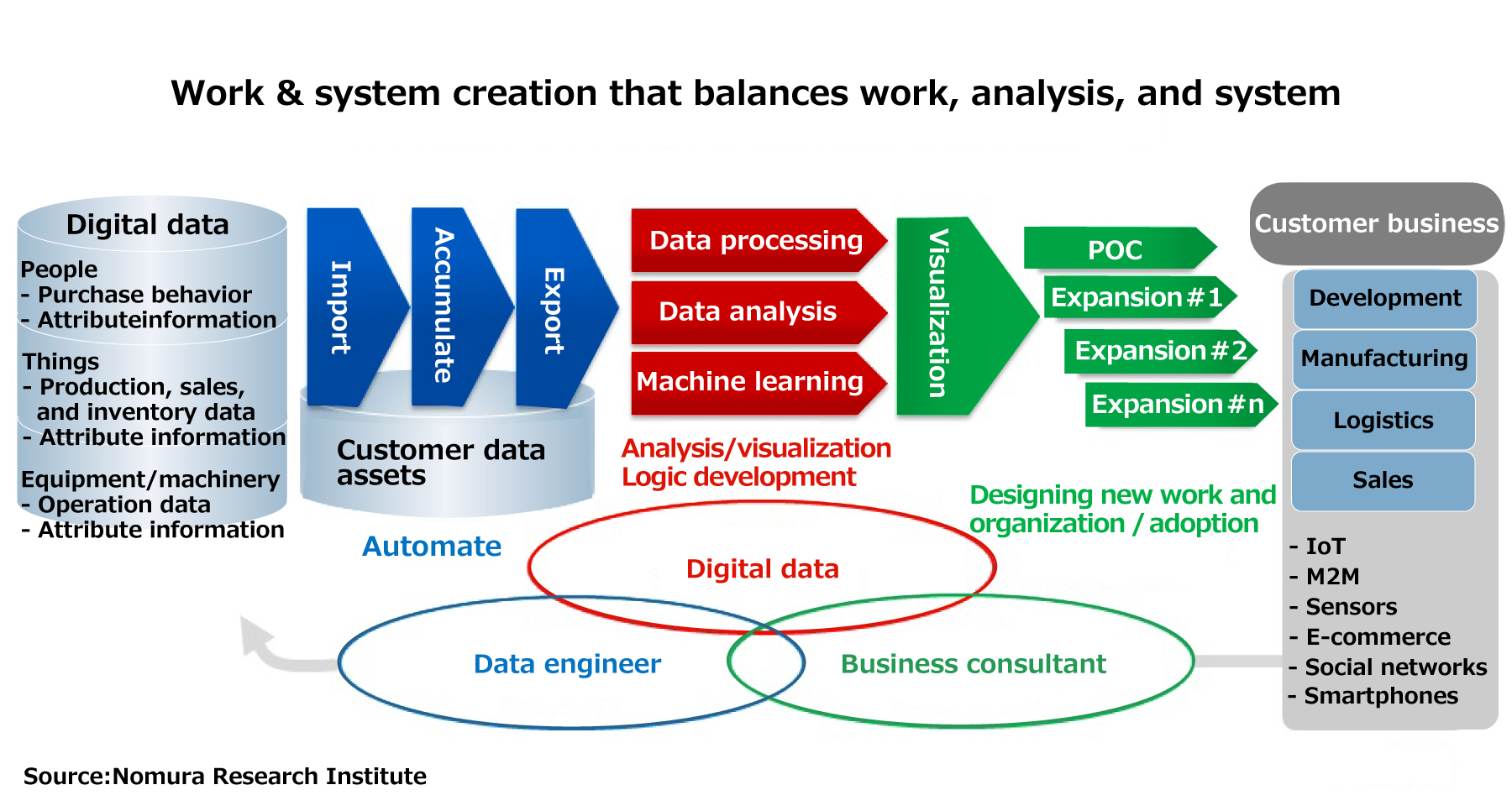
Data scientists who understand business
More and more companies are adopting IoT and AI but have trouble analyzing and utilizing big data and feel that their return on investment is inadequate. Data scientists are the key to a utilization of data that is truly helpful for a business—but what roles do data scientists fulfill?
We asked . Numazawa, who leads the Analytics Design Group of the NRI Systems Design Consulting Department, about the current and future jobs of data scientists.
Data scientists are becoming active in more and more industries
――The number of companies adopting IoT is increasing, but what kind of jobs are data scientists involved in?
For example, Japanese construction machinery manufacturer, Komatsu is famous for equipping all the construction machinery it manufactures with sensors, and using the acquired data to perform predictive maintenance. This is because machinery failures at construction sites directly lead to work delays, and frequent delays can cause huge business losses. If past data can be used to arrive at general rules that identify the conditions that lead to machinery failure, this can enable maintenance to be performed before failure occurs and thereby eliminate failures altogether.
The main job of a data scientist is to collect and analyze the required data and create methods and logic for solving problems in such situations. With the spread of the Internet and low-cost sensors, various types of data can now be obtained at factories and stores, in addition to e-commerce and Web-related businesses. That is why regular companies also need data scientists.
Designing optimal solutions with various methods and tools
――How are data scientists active at a consulting company such as NRI?
The consulting of NRI first clarifies the ideal business together with the customer, and then designs the required organizations, business rules, and information systems, etc., to achieve that business. In recent times, data analysis has become essential for conducting this design. NRI targets customers in all industries: we have worked in various fields, such as manufacturing, retail, finance, and real estate. Some jobs can be completed entirely on the Web, and some require me to visit manufacturing plants, and that provides me with stimulating experiences.
Data scientists who have transferred to NRI say that their jobs are worthwhile and they enjoy discussing how to use data with the customer, since the NRI approach that always focuses on work and business means that they are not always performing detailed data analysis in front of a computer.
――Customer needs must be quite different every time.
I believe that one defining feature of NRI is that we do not use fixed data analysis methods and tools, which enables us to flexibly respond to such diverse needs.
For example, I once had to work on determining the factors that cause vehicle engines to malfunction, and the customer said that they would like to use deep learning. NRI data scientists conducted simulations using a method that can be applied to things other than deep learning, and recommended that the "random forest" approach be used, as it had the highest percentage of correct answers and a tested causal relationship. Although I selected an approach that differed from the customer's request, the customer was satisfied with the analysis result, and the solution ended up being adopted on-site. The reason why we are able to provide solutions that tackle the essence of customer problems is because we understand and are able to use a wide range of methods and tools, and because we always keep an eye on the latest technical information.
Tackling issues with teams of three
――Optimal proposals cannot be made without understanding the customer's business.
Sometimes the customer does not have a clear plan about what they want to achieve using AI and IoT. In such cases, it is not enough to simply look at past consulting examples or leading examples and proposing tools that might fit. We need to visit the customer, identify their problems, check the data, and determine the reason why the results are unsatisfactory. We can then carry out an objective evaluation and propose what must be done, then start working with the customer until the desired results are achieved. We place importance on providing such a service.
Since it is difficult to achieve all of this alone, we normally form a team to handle projects. A team consists of a consultant to analyze issues, define the problem, and create a scenario to solve the problem, a data scientist to select tools and create logic, and a data engineer to automate data and simplify processing, etc. However, the core of the team is where business consulting skills are found.

――In conclusion, please tell us the appeal of your job.
The appeal of my job is being able to be involved with various types of issues, utilize my data science abilities in business, and help my customers transform their work and create a new future. It can be difficult to directly understand how much work efficiency has improved or how much profit has been made—that is, to be responsible for output—but that excitement is also part of the fun.
Profile
-
Yu Numazawa
* Organization names and job titles may differ from the current version.